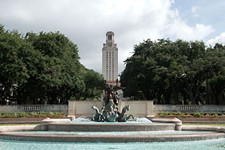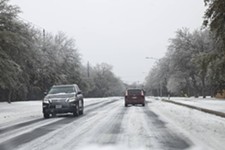Still Fighting Redistricting
Plaintiffs argue state used inaccurate census data
By Kimberly Reeves, Fri., Jan. 21, 2005
Attorney General Greg Abbott released a series of briefs late Friday afternoon, including a response to an amicus brief filed by University of Texas law professors, Travis County, and the League of United Latin American Citizens, who wrote that mid-decade redistricting should take into account the "phenomenal growth" and population shifts in Texas between 2000 and 2003.
A three-judge panel heard the challenge to the Texas redistricting case last summer. Last January, they ruled in favor of the state. In October, the U.S. Supreme Court vacated that judgment and sent the case back to the three-judge panel, asking them to reconsider the case in light of the ruling on the Pennsylvania redistricting case of Vieth v. Jubelirer, which also took up the issue of political gerrymandering.
The Vieth case was a 4-1-4 split, with Justice Anthony Kennedy in the middle, stating in his opinion that he could not support a case for partisan gerrymandering in Pennsylvania, if only because plaintiffs in the case had not provided what might be considered "judicially manageable" standards for what might be considered partisan gerrymandering. The Supreme Court now looks toward the Texas case for those standards.
The UT professors, along with Travis County and LULAC, argued that the state's redistricting plans violated "one person, one vote." As the minority population shifts and changes, those groups are no longer accurately represented by 2000 census data. The amicus brief argues that the state did not make a "good faith effort" to take those population shifts into account when the map was redrawn in 2003.
In its response, the state argues that a "one person, one vote" argument is "an undisguised attempt at a backdoor judicial prohibition on 'mid-decade' redistricting" that the court has already concluded was both legal and permissible. Decennial census data is considered "presumptively valid for redistricting," absent a substantial showing to the contrary. The state goes on to say the claim failed because the plaintiffs failed to meet the burden of pointing out any equal-population violation the new map created.
The brief cites a number of Supreme Court cases that support the use of decennial data as the 'best population data available,' lacking any replacement data of equal validity. The fact that the census data is the "best available" is undisputed, according to the state's brief, and the plaintiffs didn't offer an alternative or provide a map that demonstrates how the lines could have been redrawn for a fairer balance.
"That the University Professors and Travis County have not offered legal authority is no slight on their research skills," wrote the state in its brief. "Rather, it reflects that the rules they propose are both novel and contrary to law. Their arguments – by demanding a presumption of unconstitutionality – ask this Court to overrule binding Supreme Court precedent establishing that the burden of proof in equal-population claims falls on the plaintiff and the requirement that the plaintiff offer a means of achieving a lower population inequality."
The three-judge panel, led by Judge Patrick Higginbotham of the 5th Circuit Court, will take testimony on the redistricting challenge in Dallas this Friday, Jan. 21.
Got something to say on the subject? Send a letter to the editor.








